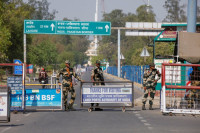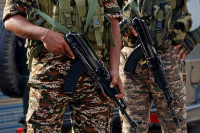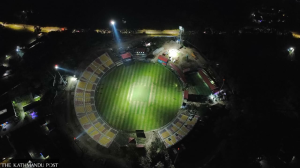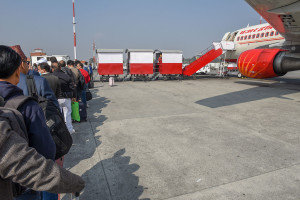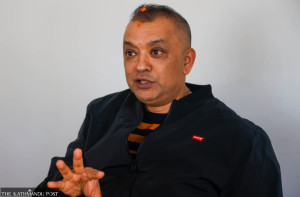Opinion
Without direction
Nepali Congress needs to help the government end the crisis in the Tarai and the Indian embargo
Khagendra N. Sharma
Nepali Congress (NC) is indisputably the Grand Old Democratic Party. The credit for ending the Rana regime and introduction of democracy goes to the NC. The Grand Old Democratic Party has been in the saddle of the state time and again. In the process, it has always promised to adhere to democratic principles. But it has derailed from the practice of good governance on several occasions. This stems from the nature of the party organisation itself. In clear terms, the party is not governed democratically. This is not only my observation; it is based on complaints from the rank and file of the party.
The purpose of this article, however, is not to review the past performance of the NC but to focus on the role of opposition it has chosen for itself. It was the major partner in the coalition that helped to draft and enforce the new constitution of the Federal Democratic Republic of Nepal. It was no small achievement and the NC must share its credit with all the partners in the coalition and also the Maoists who were technically the opposition. It can be understood that NC President and then PM Sushil Koirala wanted to be credited with the feat before resigning as PM because, as it was rumoured, he had a tacit agreement with the CPN-UML that the government would thereafter be led by UML leader KP Oli. But in the given tacit agreement it was not implied that the NC would be separated from the coalition. Herein lies the lack of understanding among the NC leaders of the real problems of transitional Nepal.
Through the ages
The basic logic behind the NC’s decision to remain in the opposition was that democracy needs a strong opposition. While accepting the partial truth in this assertion, it should not be forgotten that that is not the lone pre-condition for the success of a democratic system. In the present case, it is obvious that Nepal is still in transition. In the last eight years after the adoption of the Interim Constitution, not a single step had been taken to institutionalise the republic except removing the royalty from the throne. Everything was done only for the transitional phase. Similarly, the Interim Constitution was also called a constitution of a federal system, but not a single step was taken to initiate the process of creating a federal structure. The first Constituent Assembly (CA) failed to write a new constitution. Miraculously, a second CA was created to complete that job. In that role the CA has given an incomplete constitution before being dismissed. The job of completing the constitution has been left to Parliament without settling the disputed issues that have put the whole country in a limbo.
The new constitution was given the final shape with a section of Nepal still disputing it for solid political reasons. The issue of creating federal units, the number and size, has been the bone of contention right from the beginning. It was due to this reason that the first CA could not produce the document. The second CA had enough time to deliberate and negotiate with dissatisfied groups with a view of bringing them into consensus, but the haste to enforce the constitution left the dissatisfaction untouched except to say that the real federal units would be defined by a Commission that was not even formed. If certain sections represented in the CA are not satisfied with the decision of the CA itself, which is the final authority to draft the constitution, how could it be reasonably expected that the so-called Commission would bring out an acceptable breakdown? Those issues needed the attention of the whole nation. The enforcement of a new constitution needed the attention and strength of a united nation. But the decision of the NC to opt for the role of the opposition has virtually made Nepal a divided nation. That is why Nepal is being bullied and humiliated.
So much to do
India has made it clear that it wanted the Nepal government to address the demands of the Tarai groups addressed before enforcing the constitution. The leadership should have understood that the future course was going to be rough. Led by the NC, the incumbent force should have simultaneously discussed with India and the Tarai groups on the various ways in which those issues were addressed in the proposed constitution and how desired changes could be added with consensus. But the leaders were in a hurry to announce new constitution. This was deliberate complacency. The result is that the Tarai region is in revolt and the government of India has imposed an undeclared but a virtual blockade of essential goods, mainly of petroleum products for which we are entirely dependent on India. This outright blockade by India was imposed to embolden the rebelling Tarai groups. Is this not the result of the lack of far sightedness of the NC? Is it the right time for the NC to stay away from the responsibility of the enforcing the constitution?
The Parliament has just over two years’ tenure left, but a lot of work is to be done to actualise the restructuring of Nepal. In the first place, the number and size of the federal units needs to be finalised. With the NC as a major partner the incumbency would be not only more powerful but also more trustworthy. That strength and trust would work to persuade the revolting groups to shun rhetoric and offer acceptable and rational alternatives to change the constitution. In the second place, even after settling the federal size, the need to have the infrastructure would take more time than is available for construction. Creating eight or more new capitals is a huge task and it may have to be done in phases. Satisfactory division of resources among the states and between the centre and the states is another serious matter in which a united approach with the major parties would be essential. Several new acts will have to be initiated. Hundreds of existing laws will have to be amended. Election for the new states will have to be conducted. The reconstruction after the earthquake cannot wait. There will be resource crises to meet the all-round expenditures.
No majority party
The classical example of a strong opposition has been out of practice in the international arena with most states opting for a coalition approach. The ‘two party approach’ has failed except in the US. Alliances are the order of the day in the parliamentary systems whether in power or in opposition. In Nepal there are multiple parties all of which fail to even secure a simple majority. With the NC having now outside the coalition, the UML has had to go for an awkward bargainer in all practical negotiations because the present coalition lacks the required two-thirds majority to amend the constitution.
In the given situation, if the implementation of the new constitution is derailed who is to be blamed for it? A major share of the blame will fall on the shoulders of the NC for having left the process incomplete. The decision makers of the NC may regret, but it will have been too late.
So, I would like to request the Congress to stay with the government in negotiating terms with the Tarai rebels. And please work together with the government to pressure India to end the senseless embargo.
Sharma is a political analyst




 9.12°C Kathmandu
9.12°C Kathmandu

